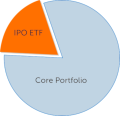
Viking Therapeutics Priced, Nasdaq: VKTX
Developing drugs to speed hip fracture recovery and treat various metabolic disorders.
Industry: Health Care
First Day Return: +12.0%

We are a clinical-stage biopharmaceutical company focused on the development of novel, first-in-class or best-in-class therapies for metabolic and endocrine disorders. We have exclusive worldwide rights to a portfolio of five drug candidates in clinical trials or preclinical studies, which are based on small molecules licensed from Ligand Pharmaceuticals Incorporated, or Ligand. Our lead clinical program is VK5211, a first-in-class, orally available drug candidate currently in a Phase 2 clinical trial for acute rehabilitation following non-elective hip fracture surgery. VK5211 is a non-steroidal selective androgen receptor modulato. A SARM is designed to selectively interact with a subset of receptors that have a normal physiologic role of interacting with naturally-occurring hormones called androgens. VK5211 has been shown to selectively produce the therapeutic benefits of testosterone in muscle and bone tissue, potentially accelerating rehabilitation and improving outcomes among hip fracture patients. We commenced a Phase 2 clinical trial of VK5211 in October 2015 and expect to complete enrollment in the trial in the second half of 2016 and complete the trial in the first quarter of 2017. We are also focused on the development of first-in-class, selective, small molecule agonists of the thyroid hormone receptor beta for lipid disorders. Our lead TRß program is VK2809, a liver-selective, orally available prodrug of a potent small molecule TRß agonist. TRß is known to regulate expression of genes important for lipid metabolism, which we believe suggests potential therapeutic benefits for patients suffering from hypercholesterolemia, dyslipidemia and diseases resulting from accumulation of fat in liver tissue, such as non-alcoholic steatohepatitis, or NASH. We plan to initiate a Phase 2 clinical trial of VK2809 in patients with hypercholesterolemia and elevated liver fat content in the first half of 2016. Our second TRß agonist is VK0214, which we are evaluating in the orphan disease known as X-linked adrenoleukodystrophy. Preclinical studies of VK0214 in in vitro models of X-ALD showed positive effects on genes relevant to X-ALD. We are evaluating VK0214 in an in vivo model of X-ALD and expect to report preliminary data in 2016. Pending completion of this work, we expect to initiate clinical trials of VK0214 in X-ALD patients.
| IPO Data | |
|---|---|
| IPO Date | 04/28/2015 |
| Offer Price | IPO Intelligence Only |
| Price Range | IPO Intelligence Only |
| Offer Shares (mm) | IPO Intelligence Only |
| Deal Size ($mm) | $24 |
| Lock-Up Date | IPO Intelligence Only |
| Street Research | IPO Intelligence Only |
| Underwriters |
|---|
| IPO Intelligence Only |
| Company Data | |
|---|---|
| Headquarters | San Diego, CA, United States |
| Founded | 2012 |
| Employees at IPO | 5 |
| Website www.vikingtherapeutics.com | |
IPO News for Viking Therapeutics

